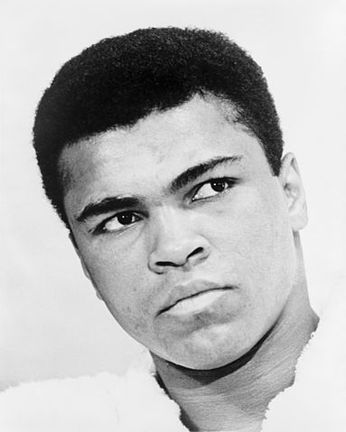 Muhammad Ali in 1967
Muhammad Ali in 1967 Dissenting
The movie Muhammad Ali’s Greatest Fight (HBO 2013) is the story of Ali’s legal battle, Clay v United States, with the American draft during the Vietnam War.
Born Cassius Marcellus Clay Jr. in 1942, he earned a gold medal in Rome during the 1960 Olympics and returned an 18 year-old hero to the US. From there on he fought his way up to beat Sonny Liston in 1964 – stunning the boxing world again – and becoming the World Heavyweight (WH) Champion.
At some point (around 1964) he began to refuse to answer to the name “Clay” and newspapers, sportswriters and pundits in general debated his right to change his name. For several months, to years and more for some segments of the population, his chosen name was refused honor. This just added to the publicity he garnered when he rhetorically and poetically began to berate his opponents (because they’d call him Clay) before and during bouts. The unexpected thing was that Ali ended up backing up his words with wins. He was well-known for his footwork ~ “float like a butterfly” ~ and his jabs ~ “sting like a bee” ~ and Ali had to endure not only racial but professional prejudice; they called him the “Louisville Lip” (a big mouth); but he fooled them all with one of the best professional boxing records ever, and is considered the greatest boxer of the 20th Century, if not of all time.
An example of Ali’s sophisticated linguistic articulations can be observed in a quote of his before the 1964 Sonny Liston fight, at 22 years of age … when he was a 7 to 1 underdog:
“Sonny is nothing. The man can’t talk. The man can’t fight. The man needs talking lessons. The man needs boxing lessons. And since he’s going to fight me, he needs falling lessons.”
In 1967 Ali was drafted and claimed Conscientious Objector (CO) status, which was refused by his local draft board. He was immediately stripped of his WH title and, for many Americans, was considered a pariah and a draft dodger, especially considering his work as a professional boxer. For four years, until the decision was handed down in June of 1971, he lectured all over the US and became a counter-culture hero ~ a voice of dissent.
The Supreme Court decision in Ali’s favor was actually based on an earlier exemption to the draft granted to Jehovah’s Witnesses. While the Supreme Court was pontificating on their decision to announce a denial of Ali's claim to CO status, law clerks found an earlier decision on the Jehovah’s Witnesses and pointed out to the Justices that the local draft board had not articulated exactly why his claim was denied at that level. The Supreme Court, when confronted with this fact, came around to agree with Ali’s claim and he was vindicated; he had been facing five years in prison and a $10,000 fine, and had already suffered loss of income (and status) while his religious freedom battle was being fought. At the end of it all, Ali was quoted as saying he felt no animosity toward the Supreme Court or the United States: they had their job to do and he had his.
In 1974 he fought George Foreman in Kinshasa Zaire; this wasn’t his first fight since his CO troubles, but the first fight again for the WH championship. He told interviewer David Frost: “If you think the world was surprised when Nixon resigned, wait ‘til I whup Foreman’s behind!”
He did.
William Abens, author
~
*Tomorrow, 11 November, Ew Publishing’s Veterans Day Run wraps-up with Robert E. Lee’s Nemesis, the Gallant Fourteenth.
Posted by Bryan W. Brickner
| | |
 RSS Feed
RSS Feed
